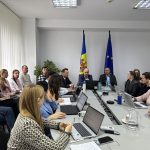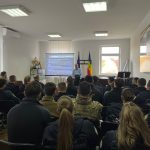NCPDP organized an event for parents: “Protect your child in the online environment!”
 834 Views
834 Views
NCPDP organized an event for parents: “Protect your child in the online environment!”
For the European Data Protection Day, the National Center for Personal Data Protection (NCPDP) organized, for the first time, a public event for parents and children in collaboration with General Police Inspectorate (GPI), “Moldcell” – mobile network operator, Public Association “Solidary Parents” and Directorate-General for Education Youth, Sport and Culture.
The event gathered about 60 parents, including children, from the parent committees and students from primary, secondary and general educational institutions, Botanica sector. During the event, personal data protection experts from NCPDP, GPI and Moldcell presented information on the risks to which children are exposed in the online environment, the cases examined in this field, as well as a set of recommendations for parents and children to avoid unpleasant situations in the online environment.
In his presentation, Victor Rotaru, main state inspector of Conformity Department, NCPDP, emphasized the practical aspects regarding the protection of children’s personal data. In this regard, the representative of NCPDP exposed some negative practical cases of non-compliance of children’s personal data processing in the online environment, namely: publication of children’s personal data through Youtube, social networking sites, TV; publication of court decisions containing children’s personal data without anonymization procedure; publication by parents of children’s pictures on social networking sites. Among the best practices were listed the following: blurring of children’s faces in TV reports, transmission of personal data between public authorities in case of vaccination, lack of video surveillance cameras in sports halls, where children practice sports, etc.
GPI representative, Ion Bubulici, Head of the Child Protection Section, Centre for Combating Cyber Crimes of National Inspectorate of Investigation listed a number of risks to which children may be exposed in the online environment, including: identity theft, theft of personal data, exposure to illegal or harmful online content, victimization by intimidation, threat or harassment (cyberbullying), destruction of online reputation, sending or receiving video clips, sexual images or messages, excessive computer use, internet dependence and video games addiction, etc.
“Moldcell” – mobile network operator has joined the NCPDP event, promoting the message “Internet without worries!” and how important is to be parent in the digital area. In this context, Diana Buciuscan, data protection officer (DPO) of Moldcell said that the best online safety of the child are parents and the knowledge of the concept – “online security” is essential in the context of the evolution of modern technologies.
The experts from these three institutions also came with advices for parents and children regarding: How to behave on Internet!
1. Use Internet together with children.
2. Install the computer in an open area, from where you can monitor the child’s online activity.
3. Use strong passwords. More characters the password contains, more secure are the social media profiles!
4. Use “parental control” mechanisms and install Internet filtering tools.
5. Find out what data other individuals or organizations collected, posted or distributed about you online (schools, sports clubs, etc.).
6. Analyze what you share on social networking site and the impact that information can have on you, your family or your employer.
7. Show to children how to use security settings in the online environment.
8. Educate children never to provide personal information and photos to their correspondents.
9. Read the security policy of the web pages you access!
10. Encourage children to let you know if someone in the online environment is making them feel uncomfortable or provoke fear!
It should be mentioned that NCPDP intends to continue this format of training for parents and children in all sectors of Chisinau.
NOTE: During the discussions, were disseminated informative materials elaborated within the EU Twinning Project.








